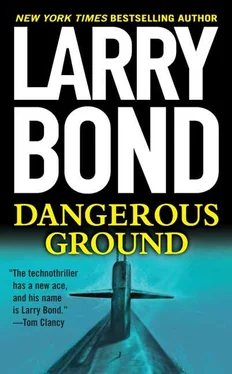“Is there anything about this mission that you’ve forgotten to tell me?”
Jerry, surprised and confused, quickly answered, “No, sir!”
“Captain Hardy indicated you’d been hand-picked for this assignment.”
“Nobody told me if they did.”
Bair didn’t look convinced. “Look, mister, your story is all over the ship. It’s nice to see a man fighting to stay in the Navy, but people with pull aren’t going to impress anyone on this boat.” He leaned forward in his chair, spearing Mitchell with his eyes. “Did you use your pull to get aboard Memphis? Did this ‘special mission’ sound exciting?”
“No, sir, absolutely not! I was supposed to go to another boat, USS Hartford , until my orders were changed to add Manta school. That was just a few weeks ago, and I swear I don’t have a clue about why I was assigned here.”
The XO didn’t look happy, but didn’t press Jerry further. “All right, mister. Finish getting squared away. The Captain will be back aboard this evening, and he wants to talk to me about you,” he said, pointing at Mitchell. “I suspect that he’ll also want a word with you himself.”
“Aye, aye, sir.” Jerry got out and took the few steps forward to his stateroom. He shared the space with Lieutenant (j.g.) Berg, the Communications Officer, and Lieutenant Washburn, but right now he had the place to himself. He finished unpacking, organizing his clothes and books in a space that made a closet look roomy.
His right arm was sore, and he absentmindedly picked up a hand exerciser and began squeezing it. It still hurt, maybe a little more than usual, but the action gave him the illusion of doing something constructive.
The pain was okay, according to the docs, even a year and a half after the crash. He smiled. At least it didn’t hurt as much as it did a year and a half ago.
* * *
“A compound fracture of the radius and ulna.” They didn’t even need X-rays to diagnose it. And it wasn’t a clean break, either. It had finally taken three operations and three months before they were done with him. And from now on, he’d always know when it was going to rain.
The Navy always taped air operations, in case of accidents, and they’d released the video of Jerry’s crash. It showed his Hornet smoothly accelerating down the runway, jet exhausts filled with blue flame, then a small puff of white appeared by the right wheel. That was the only sign of trouble, but the jet suddenly veered off to the right. The canopy flew off a fraction of a second after the puff, followed by the pilot’s seat (That’s me, thought Jerry) on a pillar of flame and smoke. The chute popped, but didn’t deploy fully before Jerry was slammed onto the concrete surface. It had even made the news.
He’d seen it a dozen times and could look at it now without feeling the pain of the landing — and of failure. Loss of an airplane, loss of a career. The Board had cleared him completely, and he almost believed them.
Between operations, he’d stayed at the squadron, his career on medical hold. He’d hated it, hanging around pilots and airplanes but unable to fly. Commander Casey had given him a boatload of collateral duties to keep him busy, but it hadn’t taken Jerry’s mind off the accident. And then the Navy had started.
It was a fair offer. It wasn’t Jerry’s fault he wasn’t able to fly anymore, so they gave him a choice. He could transfer to the surface fleet or accept an honorable discharge.
Jerry couldn’t abide the idea of a discharge. He’d joined the Navy because he liked what it stood for and what it did. He’d always liked speed, and a challenge, since he’d been old enough to walk. First stunts on skateboards, then motorbikes, and skydiving. His girlfriends had called him an “adrenaline junkie,” usually right before they dumped him, but it wasn’t the danger he loved so much as the rush from succeeding at some difficult task. He was an A student for the same reason.
Now the Navy wanted to take away his latest success, when it was in his hands. Except one of his hands didn’t work so well anymore. But he was all right for surface ships, said the detailer. He could still have a naval career. The medical restriction only applied to aviation.
What about subs? Jerry had asked. The detailer had said that yes, he was certainly fit for duty on subs, but the submariners had their own training pipeline, and he was too far along in his training to start.
But Jerry’s mind had suddenly fixed on subs as his goal. If he couldn’t fly, he’d serve in subs instead. He’d need a waiver, the detailer had said, as if that decided the issue.
A “waiver” was Navyspeak for permission to break a rule. The Navy would grant waivers to selected individuals on a case-by-case basis. He’d seen guys too old for flying get waivers because they’d had previous service experience. He’d seen guys with family problems get waivers allowing them to take extra time in the training program. The Navy wrote the rules, and the Navy could break them, too. When it wanted to. Usually, it didn’t want to.
Commander Casey knew Jerry well enough to understand what drove him, and he believed that Jerry would be “. an asset to the service. But I’ll have to tell you, kid, that the Navy spends just as much training a submariner as it does an aviator.”
“Why does that matter?”
“They’ve spent as much time and money on you as they want to. It didn’t play out, and that’s nobody’s fault, but now they want to get some work out of you in return for your paycheck. Or stop the paychecks and give you a discharge,” he said sourly. Casey didn’t think much of that idea, either.
“But I can make the grade,” Jerry insisted. “Six months at Nuclear Power School, then six months at prototype. I can do it.”
“Jerry, you could be a brain surgeon if you wanted to,” replied Casey, but then he paused, glancing at his scars. “Well, maybe not that. But this isn’t about whether you’re capable.” He sighed. “It’s about ‘the road not traveled.’ You made your choice when you joined the Fleet. It’s too late to go back and start over.”
“I’m not too old,” Jerry countered.
“Yes, you’re within the age limit, but every time the Navy spends money training a new officer, it takes a risk. He can do well in training, but still make a poor officer. If he’s no good, or even if he’s good but decides he doesn’t like the Navy, and leaves after his first term of service, the Navy loses its investment. If you trained to be a submariner, it would double their financial risk, as well as eating up another year and a half of your first four years. You’d barely have a year left before you could leave the service.”
“But I don’t want to leave! I’ll extend. They can start my four years from when I begin sub school.”
The commander had run out of arguments, but he couldn’t just give Jerry an order. “Jerry, I’ve seen how you apply yourself to any task. This situation’s no different. You have to choose a new path. Apply yourself to making that choice with the same effort you applied to flying an airplane.”
It was good advice, but Jerry hadn’t used it the way Casey had meant it. The next morning Jerry had laid a request for a waiver allowing him to transfer to submarines on the skipper’s desk. Casey had shaken his head, but passed it up the chain. He’d even “strongly recommended” approval, knowing that it wouldn’t make any difference. Jerry had to run with this. Once it had run its course, Jerry could get on with the rest of his life.
Jerry did run with it. He argued and wheedled his way up the chain of command. In between physical therapy sessions, he read every Navy personnel manual he could borrow. He hunted down anyone on the base who had been a submariner, or who had known a submariner, looking for information, angles to play, maybe even a new connection.
Читать дальше












